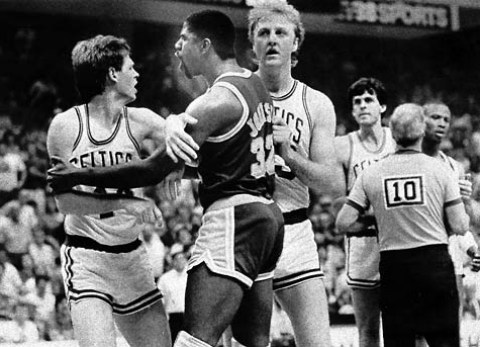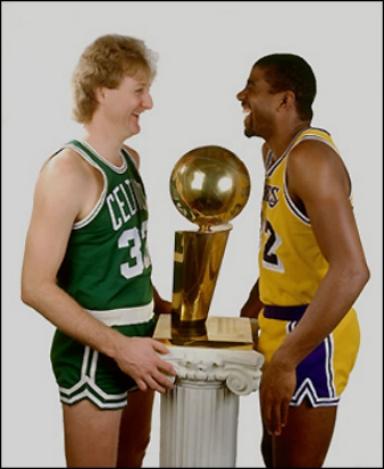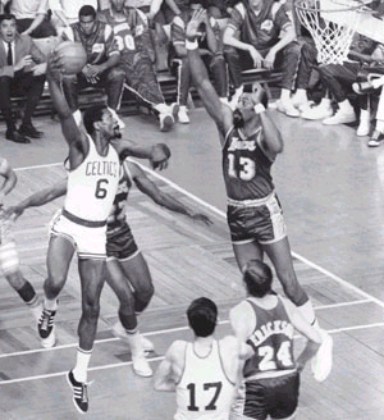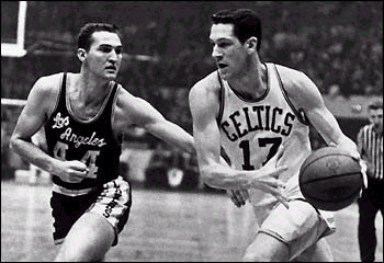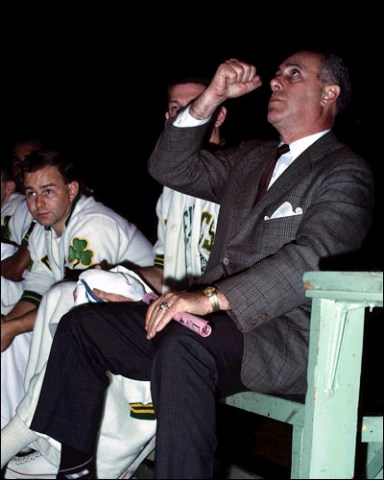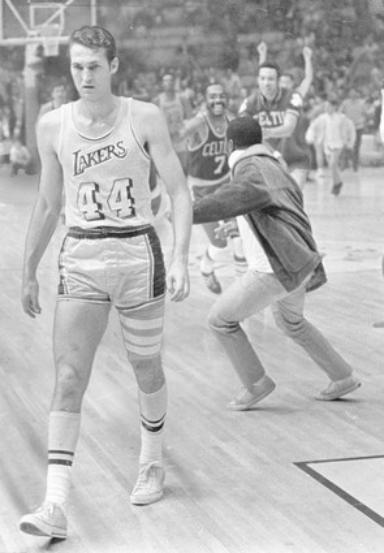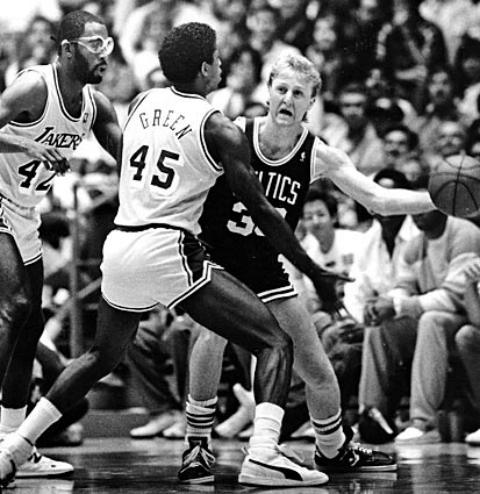
This is Part 9 of our The Worst of Celtics-Lakers series. This should have been the greatest championship series of the 1980s -- maybe ever -- but instead it turned into the most lopsided Larry-Magic Finals. For various reasons, which I will bitterly complain about below.
1987 NBA Finals
Expectations: The 1985-86 Celtics were really freaking good. They won 67 games and would have won 70 for sure if Larry Bird hadn't played the first 30 or so games with a debilitating back injury. They stormed through the regular season and the playoffs in such overwhelming fashion that many people thought they would become the first repeat champions since the 1968-69 Celtics. Which led to this (probably) unintentionally hilarious music video (hat tip to Ball Don't Lie and The Commission) called "First Time Since '69" (and no, it's not a porn video...no Rick Rolling here).
Len Bias: After the Celtics won the championship in 1984, Red Auerbach shipped Gerald Henderson to Seattle for the Sonics' first-round draft pick in 1986 (and thus the drafted player would be available for the 1986-87 season). This move backfired somewhat in 1985, when Boston's bench failed them in the Finals. But when the Sonics got the second overall pick in the '86 draft, it appeared to be another Auerbachian master stroke. Boston gleefully selected Len Bias -- Brad Daugherty was selected first by the Cleveland Cavaliers -- and it looked like the Green Reign would last for the rest of the decade. After all, the Celtics had just won the NBA championship with one of the best teams of all time, and now they were adding a player who was drawing favorable comparisons to Michael Jordan (although, in retrospect, he was more like an early Vince Carter prototype, only with balls). Said Bird: "He would have been one of the greatest ever. I thought we had won another championship on draft day."
But joy and celebration were soon replaced by shock and grief. On June 19 -- 1986, less than 48 hours after the Celtics had drafted him -- Bias died of a cocaine overdose. It was a crippling blow from which the Celtics never really recovered (until this season, I suppose). For the sake of perspective, here are some of the players that Boston passed over for Bias: Ron Harber, John Salley, Mark Price, Dennis Rodman, Jeff Hornacek, Drazen Petrovic and Kevin Duckworth (sorry, couldn't help myself).
Bill Walton's foot: One of the primary reasons that the 1985-86 Celtics were so great was the presence of Bill Walton, who that season was the NBA's Sixth Man of the Year and the best backup center (to Robert Parish) of all time. Walton's entire career had been dogged by injury, but he appeared in a career-high 80 games during that one miracle season in Boston (his previous best was 67). Boston looked like a mortal lock to repeat for the first time since 1969...as long as Walton could remain healthy. But, of course, he could not.
A week before training camp, Walton and Robert Parish met at the Celtics training facility at Hellenic College to play one-on-one. While trying to block one of Parish's shots, Walton jammed the pinky finger on his right hand against the Chief's elbow. The finger broke, and Walton was encouraged (read that: forced) to sit out until it healed. But Walton was so intent on maintaining his conditioning during the layoff that he began riding his stationary bike at home for as many as eight hours a day (I am being completely serious). Soon, Walton began feeling pain in his ankle and foot. The ankle injury was diagnosed as "an inflammation of the outside joint of the right ankle." But further bone scans revealed yet another stress fracture in his troublesome foot. When the injury didn't respond to therapy and rest, Walton underwent surgery with the hopes of being ready and available for the playoffs. But other than a few token postseason appearances -- during which he was an awkward, shambling ghost of his former self -- Walton's career was effectively over.
Worse even than the loss of Walton was the devastating psychological effect his "maybe he'll be back, maybe he won't" status had on the team. Every time it looked like Bill might be ready to suit up, the Celtics would get excited. Then, when Bill couldn't go, their spirits would be deflated. And this happened over and over again during the season. As Bird put it: "Having Bill here was like a time bomb."
Illness and injuries: Walton was the first Celtic to go down, and then the rest of them started falling like dominos. Danny Ainge missed the first 11 games of the season with a bad back, and he struggled throughout the playoffs with knee and hamstring injuries. Larry Bird missed eight games with back, ankle and Achilles tendon injuries. Robert Parish played in 80 games, but he was suffering from tendonitis in both arms -- when he belted Bill Laimbeer in Game 5 of the 1987 Eastern Conference Finals, he said his one regret was that the tendonitis wouldn't allow him to make a fist -- and chronic sprains in both ankles. Scott Wedman was limited to six games due to an ongoing left heal injury, for which he had a surgery in January of '87 that basically ended his career. Jerry Sichting was hampered all season by a nagging intestinal virus. Hell, even coach K.C. Jones missed four games with strep throat. It was just that kind of year. But the worst injury of all might have been to...
Kevin McHale's foot: The losses of Walton and Wedman coupled with the impairment of Sichting meant that the Celtic "bench" was effectively reduced to Fred Roberts, Darren Daye and Greg Kite. In other words: Worst bench ever. For this reason, Boston's starters were forced to log heavy minutes night after night (Bird led the league in Minutes Per Game at 40.6). As any personal trainer will tell you, chronic fatigue will lead to injuries. The rest of the Celtics were suffering from them. And soon it was McHale's turn.
Mind you, McHale was having the best season of his career: He averaged 26.1 PPG, 9.9 RPG and 2.2 BPG. He shot over 60 percent from the field and better than 80 percent from the line, which is the only time anyone in NBA history has done that. He was named to the All-NBA First Team and All-NBA Defensive First Team. There was even talk about McHale possibly winning the MVP award (he eventually finished fourth in MVP voting, just behind Bird).
Unfortunately for Kevin and the Celtics, everything came undone on March 11, 1987, when Larry Nance (then with the Phoenix Suns) stepped on McHale's foot and caused a hairline fracture. Boston's medical team failed to correctly diagnose the injury and McHale continued to suffer for it...and he couldn't understand why. Said McHale: "People kept telling me, 'It's in your head.' I said, 'No, it's not. It hurts all the time. It hurts at night, during the day, all the time.' At the time, our medical staff would say, 'Ice it and forget about it.' But that was not going to work. I had played on it so long. I shouldn't have. In the Detroit series [the Eastern Conference Finals], it fractured all the way through. I went to turn on it and it felt like someone stuck a poker in my foot. It was white hot. I should have stopped then."
But he didn't. Then, during the first round of the playoffs, the Chicago Bulls team physician Dr. John Hefferon took a look at X-rays of McHale's foot. Having dealt with Michael Jordan's broken foot the year before, he knew exactly what he was looking for. Once the Celtics had been informed of the nature of McHale's injury, they allowed him to decide whether or not he should continue to play (which was and still is ridiculous). McHale didn't want to let down his teammates. He wanted to win. So he kept playing. Even after the navicular bone in his foot split like a piece of firewood.
McHale's performance in the postseason was nothing short of astounding. Forget all that crap about Jordan's "flu game" or even Willis Reed playing a few minutes in Game 7 of the 1970 NBA Finals. Kevin McHale played the entirety of the 1987 playoffs with a broken freaking foot. Think about that. And he still averaged 21.1 points (on 58 percent shooting) and 9.2 rebounds in 39 minutes per game. As McHale put it: "I never knew how good I was until I had to play on one foot. I'd still get 20 points and eight or nine rebounds. I said to myself, 'Damn, if there was a league for one-footed players, I'd be All-Pro.'"
Sadly, McHale's bravery has been all but forgotten because the Celtics didn't win the title. But it should be. However, despite his solid offensive numbers, McHale's defense was hampered. He didn't have the same mobility, which had a very serious effect in the Finals (more on that later).
Given all the injury problems and the emergence of the Detroit Pistons as an Eastern Conference powerhouse, it's amazing that the Celtics even made the Finals in '87. But they did. And they got to play the sacrificial lamb to the best Lakers team of the decade.
The Celtics in Game 1: Larry Bird scored 28 points and, at one point, hit 11 straight shots...but it didn't matter. L.A. bolted out to 21-point second-quarter lead -- they had 35 fast break points in the first half alone -- and answered every Celtics run with a run of their own. The Lakers shot 56 percent and dominated the boards (51-40). McHale's wobbly wheel wouldn't allow him to stay in front of James Worthy (33 points, 16-for-23) and Magic Johnson (29 points, 13 assists) destroyed Dennis Johnson (7 points, 3-for-7). The Purple and Gold won 126-112, but it wasn't really that close.
The Celtics in Game 2: Things did not improve for Boston in the second game. Only this time Larry was the victim. Michael Cooper made a mockery of Bird's "defense" in the second quarter by orchestrating a 20-point Lakers run during which he accounted for every point by scoring or dishing. In that quarter, he tied the NBA Finals record for assists (8) and hit 6-for-7 from three-point range. The Lakers continued to run the Celtics into the ground, outscoring Boston 36-2 in fastbreak points in the first half. It got even worse in the second half. During the third period, Magic tied Cooper's tie by dishing for 8 assists of his own and the Lakers eventually won 141-122, setting an NBA Finals record by shooting nearly 62 percent for the game. Bill Walton played 5 minutes, contributing 1 rebound, 1 turnover and 2 fouls.
The Lakers in Game 3: After getting blasted in the first two games, Larry Bird was asked whether the Lakers might sweep his Celtics. Said Bird: "Nah. We're just too good a team to be swept." And he was right. But here's the crazy thing: Boston got huge games out of Bird (30 points, 12 rebounds), D.J. (26 points, 7 boards), McHale (21 points, 10 rebounds, 5 assists) and Parish (16 points, 6-for-7), but the Celtic who beat the Lakers was...Greg Kite! The Chief got into foul trouble in the second quarter, and in came Kite. He didn't score a single point, but he grabbed 9 rebounds, blocked a Magic layup and put his huge, clumsy body all over Kareem. The Celtics caught fire (17-for-21) and outscored L.A. 30-17 for the rest of the quarter. Thanks to Kite's inspiration, they won 109-102.
The Celtics in Game 4: They were pretty relieved after finally getting a win. So relieved that Bird said: "[Game 3] was the most important game of the series for us. If we lost, it might've been tough to get up for Game 4. Now it's going to be easy." He was sort of right. The Celtics led 70-55 in the third quarter and were still up 103-95 with less than four minutes left. Then everything came undone. The Lakers went on a 9-0 run as Bird, D.J. and the Chief all coughed up the ball. Bird escaped James Worthy -- who had a fistful of Larry's jersey -- to nail a three-pointer that gave the Celtics a 106-104 lead, but Kareem got fouled on the next possession. He missed his second foul shot, but McHale (who was being jostled by Mychal Thompson) bobbled the ball out of bounds. That gave the Lakers another chance, and, of course, Magic hit his "junior, junior skyhook" over The Big Three to give L.A. the win. Note, though, that McHale -- broken foot and all -- was guarding Magic on that play. He clearly didn't have the mobility to stay with Magic on that play. And thus did McHale's injury doom the Celtics again. And Bird was upset. "You expect to lose on a skyhook. You don't expect it to be from Magic. We turned the ball over twice. We missed a rebound after a freethrow. We really can't blame anybody but ourselves. A lot happened in the last minute-and-a-half. Robert gets the ball taken away from him. I throw the ball at Kevin's feet. They miss a free throw, and we don't get the rebound. How many chances do you need to win a game?" I guess they needed, like, one more.
The Lakers in Game 5: I'm not saying they didn't try...okay, that's exactly what I'm saying. Before the game, Bird told the rest of the Celtics "If they want to celebrate, let's not let them do it on the parquet." The Lakers seemingly had other ideas -- their staff iced down several cases of champagne for their "inevitable" win, reminiscent of Jack Kent Cooke's grand faux pas in Game 7 of the 1969 NBA Finals -- but they went down rather quietly. James Worthy shot 6-for-19, Kareem was 8-for-21 and Byron Scott was 3-for-10. Meanwhile, Boston shot 52 percent and all five starters scored at least 20 points. The Celtics' comfy-cozy 123-106 win was basically their consolation prize for the Finals.
The Lakers in the first half of Game 6: Kareem showed up with a shaved head and, early on, it looked like he had jinxed his team. The Celtics started strong, held Magic to only 4 points through the first two quarters, and led 56-51 at the half. It actually looked like Boston might force a Game 7...
The Celtics in the second half of Game 6: But they didn't. The Leprechauns shot 26 percent in the third quarter. Robert Parish also picked up his fifth foul in that quarter and was exiled to the bench. The Lakers built a 19-point lead and the Celtics never again got any closer than 12 points. Bird scored only 16 points on 6-for-16 shooting and committed 4 turnovers. Danny Ainge was 1-for-9. Parish got embarrassed yet again by Kareem (32 points, 13-for-18) before fouling out. And Boston bowed out with a whimper, 106-93. And that was their last shot at an NBA title...
...until now.
Sources: NBA.com, Wikipedia, Basketball-reference.com, Ever Green by Dan Shaughnessy, Drive: The Story of My Life by Larry Bird and Bob Ryan, The Big Three and The Last Banner by Peter May, Larry Bird: The Making of an American Sports Legend by Lee Daniel Levine, and this awesome Web site that has box scores for every NBA Finals through 2003.
